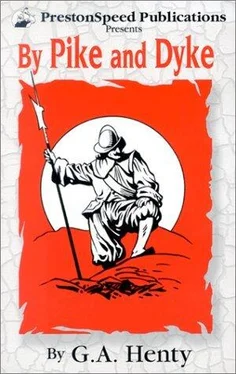G.A. Henty - By Pike and Dyke - A Tale of the Rise of the Dutch Republic
Здесь есть возможность читать онлайн «G.A. Henty - By Pike and Dyke - A Tale of the Rise of the Dutch Republic» весь текст электронной книги совершенно бесплатно (целиком полную версию без сокращений). В некоторых случаях можно слушать аудио, скачать через торрент в формате fb2 и присутствует краткое содержание. Жанр: Старинная литература, на английском языке. Описание произведения, (предисловие) а так же отзывы посетителей доступны на портале библиотеки ЛибКат.
- Название:By Pike and Dyke: A Tale of the Rise of the Dutch Republic
- Автор:
- Жанр:
- Год:неизвестен
- ISBN:нет данных
- Рейтинг книги:5 / 5. Голосов: 1
-
Избранное:Добавить в избранное
- Отзывы:
-
Ваша оценка:
- 100
- 1
- 2
- 3
- 4
- 5
By Pike and Dyke: A Tale of the Rise of the Dutch Republic: краткое содержание, описание и аннотация
Предлагаем к чтению аннотацию, описание, краткое содержание или предисловие (зависит от того, что написал сам автор книги «By Pike and Dyke: A Tale of the Rise of the Dutch Republic»). Если вы не нашли необходимую информацию о книге — напишите в комментариях, мы постараемся отыскать её.
By Pike and Dyke: A Tale of the Rise of the Dutch Republic — читать онлайн бесплатно полную книгу (весь текст) целиком
Ниже представлен текст книги, разбитый по страницам. Система сохранения места последней прочитанной страницы, позволяет с удобством читать онлайн бесплатно книгу «By Pike and Dyke: A Tale of the Rise of the Dutch Republic», без необходимости каждый раз заново искать на чём Вы остановились. Поставьте закладку, и сможете в любой момент перейти на страницу, на которой закончили чтение.
Интервал:
Закладка:
“You will have difficulty in getting off again if the Spaniards once enter the city,” the captain said. “There will be such a rush to the boats that they will be swamped before they leave shore.”
“I have a boat hidden away in which I hope to bring off the governor with me,” Ned replied. “As to myself, I can swim like a fish.”
“Mind and get rid of your armour before you try it. All the swimming in the world could not save you if you jumped in with all that steel mail on you.”
“I will bear it in mind,” Ned said. “Goodbye, countess. Good-bye, Fraulein Gertrude. I trust to see you at nightfall, if not before.”
“That is a very gallant young officer,” Captain Enkin said as the two ladies sat watching Ned as he rowed to the shore.
“You addressed him as Captain Martin?” the countess said.
“Yes, he has been a captain in the prince's service fully three years,” the sailor said; “and fought nobly at Alkmaar, at the naval battle on the Zuider Zee, and in the sea fight when we drove Romero's fleet back in Bergen. He stands very high in the confidence of the prince, but I do not think he is in our service now. He is often with the prince, but I believe he comes and goes between England and Holland, and is, men say, the messenger by whom private communications between the queen of England and the prince are chiefly carried.”
“He is young to have such confidence reposed in him,” the countess said.
“Yes, he is young,” Captain Enkin replied. “Not, I suppose, beyond seven or eight and twenty. He was a captain and high in the prince's confidence when I first knew him three years ago, so he must surely have been four or five and twenty then; and yet, indeed, now you speak of it, methinks he is greatly bigger now than he was then. I do not think he was much taller than I am, and now he tops me by nigh a head. But I must surely be mistaken as to that, for the prince would scarcely place his confidence in a mere lad.”
The countess made no reply, though she exchanged a quiet smile with her daughter. They knew that Ned could not be much more than twenty. He was, he had said, about three years older than Gertrude, and she had passed seventeen but by a few months.
Ned, on returning to shore, tied up the boat, and then proceeded to the palace of the governor. A servant was holding a horse at the door.
“The governor ordered this horse to be ready and saddled for you, sir, when you arrived, and begged you to join him at once in the marketplace, where he is telling off the troops to their various stations.”
Leaping on the horse, Ned rode to the marketplace, and at once placed himself under orders of the governor.
“There is nothing much for you to do at present,” Champagny said. “The troops are all in their places, and we are ready when they deliver the assault.”
It was not until eleven o'clock that the Spaniards advanced to the attack — 3000 of them, under their Eletto, by the street of St. Michael; the remainder with the Germans, commanded by Romero, by that of St. George. No sooner did the compact masses approach the barricades than the Walloons, who had been so loud in their boasts of valour, and had insisted upon having the post of danger, broke and fled, their commander, Havre, at their head; and the Spaniards, springing over the ramparts, poured into the streets.
“Fetch up the Germans from the exchange!” Champagny shouted to Ned; and leaping his horse over a garden wall, he himself rode to another station and brought up the troops there, and led them in person to bar the road to the enemy, trying in vain to rally the flying Walloons he met on the way. For a few minutes the two parties of Germans made a brave stand; but they were unable to resist the weight and number of the Spaniards, who bore them down by sheer force. Champagny had fought gallantly in the melee, and Ned, keeping closely beside him, had well seconded his efforts; but when the Germans were borne down they rode off, dashing through the streets and shouting to the burghers everywhere to rise in defence of their homes.
They answered to the appeal. The bodies already collected at the exchange and cattle market moved forward, and from every house the men poured out. The Spanish columns had already divided, and were pouring down the streets with savage cries. The German cavalry of Havre under Van Eude at once deserted, and joining the Spanish cavalry fell upon the townsmen. In vain the burghers and such of the German infantry as remained faithful strove to resist their assailants. Although they had been beaten off in their assaults upon breaches, the Spaniards had ever proved themselves invincible on level ground; and now, inspired alike by the fury for slaughter and the lust for gold, there was no withstanding them.
Round the exchange some of the bravest defenders made a rally, and burghers and Germans, mingled together, fought stoutly until they were all slain.
There was another long struggle round the town hall, one of the most magnificent buildings in Europe; and for a time the resistance was effective, until the Spanish cavalry and the Germans under the traitor Van Eude charged down upon the defenders. Then they took refuge in the buildings, and every house became a fortress, and from window and balcony a hot fire was poured into the square. But now a large number of camp followers who had accompanied the Spaniards came up with torches, which had been specially prepared for firing the town, and in a short time the city hall and other edifices in the square were in flames.
The fire spread rapidly from house to house and from street to street, until nearly a thousand buildings in the most splendid and wealthy portion of the city were in a blaze.
In the street behind the town hall a last stand was made. Here the margrave of the city, the burgomasters, senators, soldiers, and citizens fought to the last, until not one remained to wield a sword. When resistance had ceased the massacre began. Women, children, and old men were killed in vast numbers, or driven into the river to drown there.
Then the soldiers scattered on the work of plunder. The flames had already snatched treasures estimated at six millions from their grasp, but there was still abundance for all. The most horrible tortures were inflicted upon men, women, and children to force them to reveal the hiding places, where they were supposed to have concealed their wealth, and for three days a pandemonium reigned in the city. Two thousand five hundred had been slain, double that number burned and drowned. These are the lowest estimates, many placing the killed at very much higher figures.
Champagny had fought very valiantly, joining any party of soldiers or citizens he saw making a defence. At last, when the town hall was in flames and all hope over, he said to Ned, who had kept throughout the day at his side: “It is no use throwing away our lives. Let us cut our way out of the city.”
“I have a boat lying in readiness at the bridge,” Ned said. “If we can once reach the stairs we can make our way off to the fleet.”
As they approached the river they saw a Spanish column crossing the street ahead of them. Putting spurs to their horses they galloped on at full speed, and bursting into it hewed their way through and continued their course, followed, however, by a number of Spanish infantry.
“These are the steps!” Ned exclaimed, leaping from his horse.
Champagny followed his example. The Spaniards were but twenty yards behind.
“If you pull on that rope attached to the ring a boat lying under the bridge will come to you,” Ned said. “I will keep them back till you are ready.”
Ned turned and faced the Spaniards, and for two or three minutes kept them at bay. His armour was good, and though many blows struck him he was uninjured, while several of the Spaniards fell under his sweeping blows. They fell back for a moment, surprised at his strength; and at this instant the governor called out that all was ready.
Читать дальшеИнтервал:
Закладка:
Похожие книги на «By Pike and Dyke: A Tale of the Rise of the Dutch Republic»
Представляем Вашему вниманию похожие книги на «By Pike and Dyke: A Tale of the Rise of the Dutch Republic» списком для выбора. Мы отобрали схожую по названию и смыслу литературу в надежде предоставить читателям больше вариантов отыскать новые, интересные, ещё непрочитанные произведения.
Обсуждение, отзывы о книге «By Pike and Dyke: A Tale of the Rise of the Dutch Republic» и просто собственные мнения читателей. Оставьте ваши комментарии, напишите, что Вы думаете о произведении, его смысле или главных героях. Укажите что конкретно понравилось, а что нет, и почему Вы так считаете.












